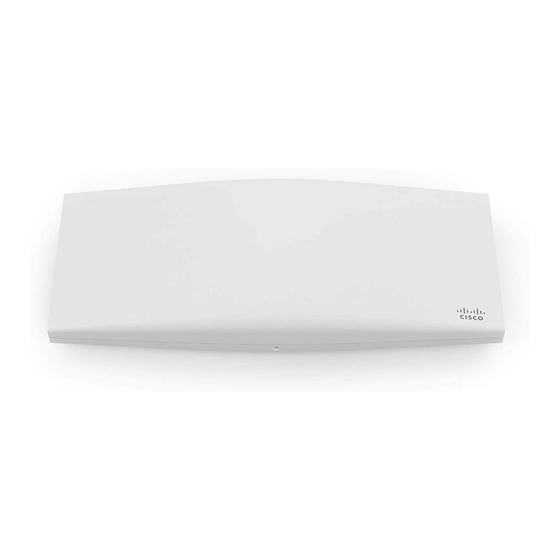Cisco Meraki MR36 Installation Manual - Page 16
Browse online or download pdf Installation Manual for Wireless Access Point Cisco Meraki MR36. Cisco Meraki MR36 19 pages.

2. Verify access point connectivity
a. Use any 802.11 client device to connect to the AP and verify proper connectivity using the client's web
browser.
3. Check network coverage
4. Confirm that you have good signal strength throughout your coverage area. You can use the signal strength meter
on a laptop, smart phone, or other wireless device.
Basic Troubleshooting
The following steps can be used for troubleshooting basic connectivity issues with your access point.
• Reset the access point
• Factory reset the access point by holding the factory reset button for 5 seconds
• Try switching cables, or testing your cable on another device
If your access point still does not connect, the following instructions may be useful, depending on your issue.
Check Radio Functionality by Making the AP a Repeater
1. If your AP is acting as a gateway, disconnect the Ethernet cable from the LAN (while keeping the AP powered
on). This will switch your AP into repeater mode. If no other gateways are within range, the AP will begin
broadcasting an SSID appended with "-scanning". If you are able to connect to this SSID and go to my.meraki.com
from your web browser, then your radio is working.
2. Physically place the repeater AP (AP with disconnected LAN) next to a working gateway AP.
3. Connect the power adapter or PoE. The radio and signal strength LEDs on the AP will turn solid green or blue
once the access point boots up and detects the gateway.
4. The access point is now a repeater and will check into Dashboard.
5. On dashboard under monitor and access points you will see the connectivity bar for the specific Repeater AP
reflecting a light green color, which means the AP is a repeater. Gateway APs will reflect a dark green color in the
connectivity bar and also will have the letter G (Gateway) on top of the AP symbol.
Check Ethernet Port Functionality by Connecting to the AP
1. Disable the Wireless adapter on your computer.
2. Make sure the Ethernet adapter on your device is set to obtain an IP address automatically via DHCP.
3. Connect your computer to the Ethernet port on the AP with an Ethernet cable.
4. The Ethernet LED on the AP should turn solid green or blue.
5. If the Ethernet LED does not turn solid green or blue, try swapping the cable. If the Ethernet port still does not turn
green or blue, try the second Ethernet port, if the AP has one.
6. If the Ethernet LED does not turn solid green or blue, you may have a bad port on the AP. If this is the case, the
AP signal LEDs will continue to scan.
7. Once the Ethernet LED turns solid green or blue, your computer should obtain an IP address from the AP via
DHCP.
16
